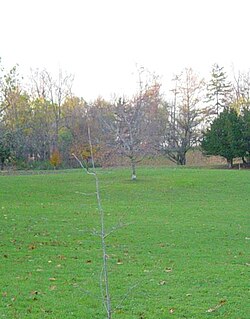
Obadiah Brown Hadwen (August 2, 1824 – 1907) was a horticulturist active in Worcester, Massachusetts.

Horticulture has been defined as the culture of plants for food, comfort and beauty. A more precise definition can be given as "The cultivation, processing, and sale of fruits, nuts, vegetables, ornamental plants, and flowers as well as many additional services". It also includes plant conservation, landscape restoration, soil management, landscape and garden design, construction, and maintenance, and arboriculture. In contrast to agriculture, horticulture does not include large-scale crop production or animal husbandry.

Worcester is a city in, and the county seat of, Worcester County, Massachusetts, United States. Named after Worcester, England, as of the 2010 Census the city's population was 181,045, making it the second most populous city in New England after Boston. Worcester is located approximately 40 miles (64 km) west of Boston, 50 miles (80 km) east of Springfield and 40 miles (64 km) north of Providence. Due to its location in Central Massachusetts, Worcester is known as the "Heart of the Commonwealth", thus, a heart is the official symbol of the city. However, the heart symbol may also have its provenance in lore that the Valentine's Day card, although not invented in the city, was mass-produced and popularized by Esther Howland who resided in Worcester.
Hadwen was born in Providence, Rhode Island and spent four years at Moses Brown School, then a further four years at the Clinton Grove Institute and one term's instruction at the Worcester County Manual Labor School. In 1844, while still a minor, he became owner of a farm in Worcester, which he improved and enlarged over the years. He became a member of the Worcester County Horticultural Society in 1847, and subsequently served as its trustee, vice president, and president. He was also a trustee and chairman of the Agricultural College at Amherst (now the University of Massachusetts Amherst), as well as commissioner of public parks in Worcester.

Providence is the capital and most populous city of the U.S. state of Rhode Island and is one of the oldest cities in the United States. It was founded in 1636 by Roger Williams, a Reformed Baptist theologian and religious exile from the Massachusetts Bay Colony. He named the area in honor of "God's merciful Providence" which he believed was responsible for revealing such a haven for him and his followers. The city is situated at the mouth of the Providence River at the head of Narragansett Bay.

Moses Brown School is a Quaker school located in Providence, Rhode Island offering pre-kindergarten through secondary school classes. It was founded in 1784 by Moses Brown, a Quaker abolitionist, and is the 69th oldest preparatory school in the country. The school motto is Verum Honorem, and the school song is "In the Shadow of the Elms," a reference to the large grove of elm trees that still surrounds the school to this day.

The Worcester County Horticultural Society is a non-profit American horticultural society based out of Boylston, Massachusetts, whose stated mission as of 2014 is to "inspire the use and appreciation of horticulture to improve lives, enrich communities and strengthen commitment to the natural world," building upon its founding mission to "advanc[e] the science and encourag[e] and improv[e] the practice of [h]orticulture". Formally established in 1842, it describes itself as the third-oldest horticultural society in the United States after the Pennsylvania and the Massachusetts societies. Today the society's work predominantly focuses in organizing and operating Tower Hill Botanic Garden, as well as supporting the Cary Award, an award program for excellence in New England cultivation practices.
Hadwen bequeathed his arboretum to Clark University for the sole purpose of education, with the following words: "Said estate to be forever kept for the purpose of educating students in Agricultural, Historical, and Arboreal knowledge scientific and practical. I adopt this course with the purpose in view of preserving the trees and plants growing thereon, being a portion of my life work, shall be preserved as an Arboretum, and an object lesson to assist students in the education of the science and art of Arboriculture and improving the landscape." He also willed $1000 to Clark University to be invested, with the annual income used "to embellish the University grounds with ornamental trees and plants".

Clark University is a private research university in Worcester, Massachusetts. Founded in 1887 with a large endowment from its namesake Jonas Gilman Clark, a prominent businessman, Clark was one of the first modern research universities in the United States. Originally an all-graduate institution, Clark's first undergraduates entered in 1902. The university now offers 46 majors, minors, and concentrations in the humanities, social sciences, natural sciences, and engineering and allows students to design specialized majors and engage in pre-professional programs. It is noted for its programs in the fields of psychology, geography, physics, biology, and entrepreneurship and is a member of the Higher Education Consortium of Central Massachusetts which enables students to cross-register to attend courses at other area institutions including Worcester Polytechnic Institute and the College of the Holy Cross. As a liberal arts–based research university, Clark makes substantial research opportunities available to its students, notably at the undergraduate level through LEEP project funding, yet is also respected for its intimate environment as the second smallest university counted among the top 66 national universities by U.S. News & World Report and as one of 40 Colleges That Change Lives.















